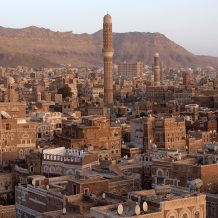Yemen’s Stolen Assets: Past and Future
In 2014, the former President of Yemen, Ali Abdallah Saleh, his son Ahmed and three other individuals were placed under UN sanctions in the context of the ongoing civil war in Yemen. These sanctions included an obligation on UN Member States to freeze assets located in their jurisdictions that were related to the listed persons in an effort to ensure that any legally or ill-gotten gains acquired by them could not be used to fuel the civil war. Since then, a Panel of Experts created under the original UN Security Council resolution has been reporting on the implementation of those sanctions, including the asset freeze.

The sanctioning of Saleh came at the end of a long process of the Saleh family’s fall from power, following popular uprisings in Yemen in 2011 and in the context of their allying with their former enemies and engaging as belligerents against the UN-recognised government in the Yemeni civil war. While the war is ongoing, questions have been raised as to whether the alleged assets of Saleh and his associates during his over 30 years in power are being used to fund hostilities, whether UN Member States are effectively freezing assets belonging to the former President, and whether the Yemeni people are ever going to see any stolen assets returned to them.
Asset recovery is the overarching term that denotes the process of identifying, freezing, prosecuting, confiscating and returning the proceeds of grand corruption from the country where the assets are hidden to the people from whom they were stolen. It is often a multi-pronged process involving law enforcement authorities from several countries cooperating and conducting investigations that span several jurisdictions.
As such, it is often a long and complicated process, with the potential for political and legal challenges at many stages of a return and cases often taking at least six years to complete. In the case of Yemen, several political and legal factors make asset recovery a particularly daunting challenge, specifically when it comes to any assets alleged to have been stolen by the former President Saleh or members of his family and associates. This includes a lack of action on the part of authorities, coupled with the problem of overcoming the legal hurdles posed by the political agreement that removed Saleh from power.
Ultimately, our report concludes that these challenges make any efforts to advance the the recovery of any stolen assets relating to the former President in the near future extremely difficult. Even after a future cease fire and peace, some of the obstacles will still remain and make it challenging for a future government. However, it also notes that considering asset recovery as part of future peace talks will be vital in ensuring that impunity is addressed and outlines other, non-traditional methods for asset recovery that could be used.
It also notes the role that other governments could play in countries holding Yemeni assets. Noting that not only do they have an obligation to ensure that all relevant assets within their jurisdiction remain frozen under the UN resolution, but they could also consider becoming more active in trying to confiscate and recover those assets, which may represent the current most straightforward way for asset recovery to begin for Yemen.
While the challenges are not insignificant, the opportunity for Yemen to benefit from any returned stolen assets and use them to rebuild once the war has ended is also important. To do so though, all sides involved need to ensure they are doing their utmost to keep these assets from being further hidden and to advance the process of recovering them where they can.
Recommendations
- Yemeni officials should engage as soon as possible in discussions with colleagues overseas about potential asset recovery and should seriously engage in the issue once the civil war is ended
- Yemeni officials should be clear with the Yemeni people about the likely limitations in terms of speed and amount returned and should work with civil society to help the public understand the broader role of asset recovery in terms of addressing impunity
- At the earliest opportunity, Yemen should establish a solid law covering responsibility for pursuing asset recovery and disposition of returned assets, ensuring that processes for both are as transparent and accountable as possible
- Yemeni officials should consider making use of non-conviction-based forfeiture laws overseas for asset recovery to avoid challenges under the GCC Agreement over immunity from prosecution
- Yemeni officials should consider requesting asset-holding countries to launch their own investigations and pursue confiscation of the assets while it is challenging for the Yemeni government to do so
- Governments holding assets should consider initiating their own procedures to recover assets for the Yemeni people
- Returning countries and Yemeni officials should ensure that any return is in line with GFAR and Civil Society Principles for Accountable Asset Return
Read the report
Any further enquiries into the report or request for comment or quote can be directed to Jackson Oldfield, joldfield@cifar.eu or Lucia Cizmaziova, lcizmaziova@cifar.eu.
